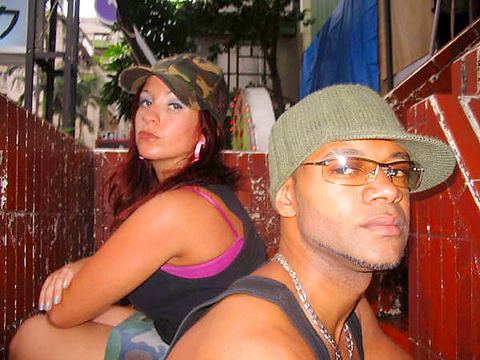Danny Rampling went out with a bang last weekend at MoS, but the clubbers Vinyl Word spoke to were just as impressed with Pierre's set.
The Selective Sessions party at the Kuta Bar last Saturday experienced some gremlins in the equipment, but the show went on. Xiao Ping the bar's manager said a buyer has been found for the place and plans are afoot to convert the whole of the downstairs floor into one big vinyl venue.
The festive season is fast approaching, with big name DJs slated to spin lots of vinyl. But before Christmas revelry officially kicks off there seems to be a bit of a lull on the dance front.

PHOTO COURTESY OF LUXY
Trance fans can get a fix at MoS tonight with Lange from the UK. Tomorrow Wally Lopez will be laying down some Iberian-inspired House.
Moving further into House territory Saucey and SL will be laying it down deep at Eden tomorrow night.
House reigns supreme in the mainstream, and tomorrow at Luxy Jr Van Den Berg, J-Six, Junior and Megan and Reason will journey through its progressive and funky spectra.
Lucid Productions is putting on a bash at The Source tomorrow night. Andrew Ford and Elements will be serving up some sweet beats. Entry is NT$500 for all you can drink.
Tomorrow Party Room is host to Capital J. This Canadian junglist is a scratch master who uses his elbows and chin to whip up dancefloors, and is touted as the country's number one drum `n' bass DJ.
The Taipei scene has developed from underground beginnings into big business. There are more club nights and venues than ever before with promoters springing up all over the place. Are there too many DJs?
"The recent influx of foreign DJs is an amazing thing. Before it was the same six people playing over and over again. But there are so many places that DJs can get a gig at now," Marcus Aurelius said.
More foreign DJs do not necessarily contribute to vinyl quality though, and some question whether local spinmeisters are being squeezed out of the scene.
"Foreign DJs get to play more, they have more opportunities than local DJs. They come to Taiwan and were not DJs in their own countries. Local bedroom DJs don't get so many opportunities," DJ Nina said.
Local DJs like Tiger, Stone and Victor have been there from the beginning, pioneering club nights, but are not as prominent on the vinyl scene anymore.
"There seems to be a lot of DJs all over the island. In Canada you play in your bedroom for a year or two then you graduate to a 7pm to 9pm slot at a club ... In Taiwan I've seen DJs who have been playing at home for around eight months get gigs," said Saucey. "In Taiwan there are more spots to pick up."
Turntablism is trendy and a lot of fun. The growing ranks of DJs, foreign and local, may be the result of a growing appreciation of dance music in general.
"There are a lot of closet DJs in Taiwan, who buy records and play them at home," Elements said.

In the March 9 edition of the Taipei Times a piece by Ninon Godefroy ran with the headine “The quiet, gentle rhythm of Taiwan.” It started with the line “Taiwan is a small, humble place. There is no Eiffel Tower, no pyramids — no singular attraction that draws the world’s attention.” I laughed out loud at that. This was out of no disrespect for the author or the piece, which made some interesting analogies and good points about how both Din Tai Fung’s and Taiwan Semiconductor Manufacturing Co’s (TSMC, 台積電) meticulous attention to detail and quality are not quite up to

April 21 to April 27 Hsieh Er’s (謝娥) political fortunes were rising fast after she got out of jail and joined the Chinese Nationalist Party (KMT) in December 1945. Not only did she hold key positions in various committees, she was elected the only woman on the Taipei City Council and headed to Nanjing in 1946 as the sole Taiwanese female representative to the National Constituent Assembly. With the support of first lady Soong May-ling (宋美齡), she started the Taipei Women’s Association and Taiwan Provincial Women’s Association, where she

Chinese Nationalist Party (KMT) Chairman Eric Chu (朱立倫) hatched a bold plan to charge forward and seize the initiative when he held a protest in front of the Taipei City Prosecutors’ Office. Though risky, because illegal, its success would help tackle at least six problems facing both himself and the KMT. What he did not see coming was Taipei Mayor Chiang Wan-an (將萬安) tripping him up out of the gate. In spite of Chu being the most consequential and successful KMT chairman since the early 2010s — arguably saving the party from financial ruin and restoring its electoral viability —

It is one of the more remarkable facts of Taiwan history that it was never occupied or claimed by any of the numerous kingdoms of southern China — Han or otherwise — that lay just across the water from it. None of their brilliant ministers ever discovered that Taiwan was a “core interest” of the state whose annexation was “inevitable.” As Paul Kua notes in an excellent monograph laying out how the Portuguese gave Taiwan the name “Formosa,” the first Europeans to express an interest in occupying Taiwan were the Spanish. Tonio Andrade in his seminal work, How Taiwan Became Chinese,